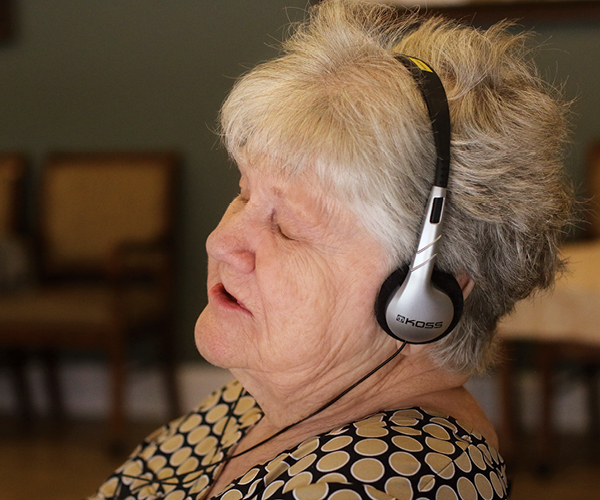
Linking to memories, improving care quality
Music ties to every memory Donna Rolufs has growing up with her mother, Ruth. Whether it was holiday gatherings or trips to the store, her mother’s voice was the soundtrack of her life. Yet 10 years ago, Ruth’s connection to music and to reality changed.
“She would get lost a lot,” Rolufs recalls. “She looked up an old boyfriend and wanted me to take her to meet him. She would get angry at times, something she never did in the past.”
That behavior ultimately led to a dementia diagnosis and the loss of the mother Rolufs once knew. But a new program bringing music to residents of skilled nursing facilities in California offers promise to those, like Ruth, whose positive pasts are interwoven with music.
Music and Memory, a non-profit organization initially founded by Dan Cohen, provides personalized music to 4,500 skilled nursing residents in 300 participating facilities during a three-year period. Researchers from the Betty Irene Moore School of Nursing at UC Davis are collaborating with the California Association of Health Facilities (CAHF) on this quality improvement initiative aimed at improving the lives of residents who suffer from Alzheimer's disease and other cognitive disorders.
“We build personalized playlists with songs they played at their wedding, with lullabies they sang to their babies and songs they danced to at the high school gym. And they go there,” says Jocelyn Montgomery, a registered nurse and CAHF’s lead on the project.
Approximately 70 percent of residents with dementia living in nursing homes are reported to have significant behavioral and psychiatric symptoms. Historically, one of the first lines of treatment was antipsychotics drugs, which are no longer recommended for residents with dementia.
“Individuals who get a customized playlist may need less medication, but it’s more than just about the medication. It’s about their quality of life,” says School of Nursing Associate Adjunct Professor Debra Bakerjian, the project’s principal investigator. “We are very interested in having a better understanding of whether or not the program can help reduce use of antipsychotics and whether the program is sustainable over time.”
Bakerjian’s more than 25 years of one-on-one, long-term care patient experience, coupled with Associate Professor Elena Siegel’s focus on administrative and managerial leadership in long-term-care settings, bring expertise to evaluate the impact of the program from both qualitative and quantitative perspectives, and identify strategies to spread and sustain the program as a quality assurance and performance improvement (QAPI) project.
Whereas man short-term studies indicate positive outcomes, this represents the first comprehensive, 36-month study to determine if it works, how it works, and if practices can be sustained for this and other quality improvement programs in long-term care facilities.
“California is a microcosm of the rest of the nation in terms of diversity, its population of older adults and the number of nursing homes that operate throughout the state,” Bakerjian adds. “As all nursing homes will be mandated by the Centers for Medicare and Medicaid to implement QAPI programs later this year, this work will enable us to develop guidelines for this project and many others that may improve quality in the long run.”
For families of those already seeing positive benefits, this program is a success.
“I’ve walked in and seen Mom in a state where she’s not really there. They put the music on her and she snaps right back,” Rolufs explains. “I am thankful this gives her those memories, and a time she can go back to and find some peace.”

